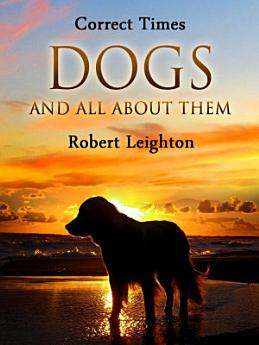Dogs and All About Them
Mär 2020 · Otbebookpublishing
E-Book
322
Seiten
family_home
Zulässig
info
reportBewertungen und Rezensionen werden nicht geprüft Weitere Informationen
Über dieses E-Book
"Dogs and All About Them" by Robert Leighton offers an enriching journey into the world of dogs, celebrating their rich history and the enduring bond they share with humans. The anthology's centerpiece, "The New Book of the Dog," meticulously chronicles the significant roles dogs have played throughout history, from ancient civilizations to the early 20th century. As dog shows and clubs gained popularity in 1909 Britain, the demand for detailed breed knowledge became essential. This narrative satisfies that curiosity by providing comprehensive insights into diverse breeds, from the robust Mastiffs to the graceful Greyhounds, using the expertise of distinguished specialists. It explores the domestication process of dogs from wolves and jackals, highlighting their revered status in Egyptian culture and their literary mentions by Greeks and Romans. This work not only emphasizes the historical significance of dogs but also enhances the modern reader's appreciation of the unique bond shared with these loyal companions. This anthology is a must-read for those fascinated by canine history, breed characteristics, and the timeless connection between humans and dogs, making it an essential addition to any dog lover's collection.
Autoren-Profil
Robert Leighton, a prolific writer and editor of the late 19th and early 20th centuries, carved a unique niche in the literary world with his extensive contributions to animal literature and children's stories. Born in 1858 in England, Leighton's fascination with the natural world was evident from an early age, a passion that would later define much of his literary career.Leighton's works often reflected a deep empathy for animals, a revolutionary stance during a time when animal welfare was not widely championed. His writings not only entertained but also educated readers about the intrinsic value of animals, subtly advocating for their humane treatment. This progressive viewpoint resonated with contemporary audiences and influenced subsequent writers who explored similar themes.In addition to his animal-centric literature, Leighton was a respected editor, contributing to several prominent periodicals of his time. His editorial work helped shape public opinion and literary tastes, making him a significant cultural influencer.Leighton's life was not without controversy. His outspoken views on animal rights occasionally clashed with the more conservative elements of society, sparking debates that highlighted the growing divide between traditional and progressive values. Despite this, or perhaps because of it, his works remained popular and influential.Modern readers may find Leighton's life and legacy intriguing not only for his literary achievements but also for his forward-thinking ideas on animal welfare and his role in shaping early 20th-century literature. His ability to blend storytelling with advocacy continues to inspire and challenge readers to consider the ethical dimensions of human-animal relationships.
Dieses E-Book bewerten
Deine Meinung ist gefragt!
Informationen zum Lesen
Smartphones und Tablets
Nachdem du die Google Play Bücher App für Android und iPad/iPhone installiert hast, wird diese automatisch mit deinem Konto synchronisiert, sodass du auch unterwegs online und offline lesen kannst.
Laptops und Computer
Im Webbrowser auf deinem Computer kannst du dir Hörbucher anhören, die du bei Google Play gekauft hast.
E-Reader und andere Geräte
Wenn du Bücher auf E-Ink-Geräten lesen möchtest, beispielsweise auf einem Kobo eReader, lade eine Datei herunter und übertrage sie auf dein Gerät. Eine ausführliche Anleitung zum Übertragen der Dateien auf unterstützte E-Reader findest du in der Hilfe.








